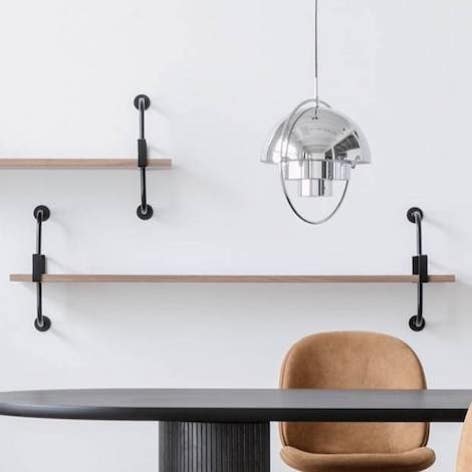

Mathieu Matégot reached his creative peak in the 1950s, with such powerful pieces as his famous Nagasaki chair. The Biblio-Démon collection of bookshelves belongs to this same fertile period, during which Matthieu Matégot enjoyed working with metal, which he generally used as the dominant architectural element. The Biblio-Démon, for example, is visually dominated by its powerful black vertical metal uprights, which serve as the collection's signature.
Vertical shelf brackets black metal.
Shelves oak, walnut or black stained ash.
Number of shelves the Biblio-Demon is available with 1, 3, 4 or 5 shelves.
Size Shelves width: 95cm, 155cm and 215cm. Shelves depth: 25cm. Shelves height: 2,5cm. Total depth (shelf + bracket) 27cm.
Oak – 1 shelf
from
Walnut – 1 shelf
from
Black stained ash – 1 shelf
from
Oak – 3 shelves
from
Walnut – 3 shelves
from
Black stained ash – 3 shelves
from
Oak – 4 shelves
from
Walnut – 4 shelves
from
Black stained ash – 4 shelves
from
Oak – 5 shelves
from
Walnut – 5 shelves
from
Black stained ash – 5 shelves
from
Mathieu Matégot

Mathieu Matégot (1910 - 2001) is one of the most famous French designers of the 50s.
He studied at the School of Fine Arts in Budapest. He then visited Italy then the United States and decided to settle in France.
In 1933, he began designing furniture with the use of rattan and metal. However, as the war was raging he decided to enroll and was later taken prisoner. After the Liberation, he devoted himself to creating objects in transparent metal and opened his own studio in Paris and Casablanca.
He showed his work in 1952 at the Salon des Artistes Décorateurs. He rapidly became a global success. He particularly influenced the world of design with his avant-garde approach to forms and materials.